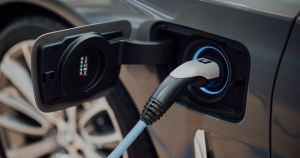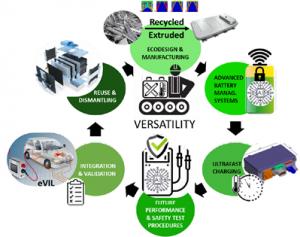January 2021–June 2024

The MARBEL project aims to design and develop an innovative and competitive lightweight battery with increased energy density and shorter recharging times with the objective to accelerate the mass market take-up of electric vehicles. IMU will be responsible for the data analytics tasks, the computation of SoX (State of Charge, State of Health, etc.) variables and the development of an AI-based system with early failure detection functionality.

More details on the project:
With the goal of accelerating the mass market take-up of ultra-high-performance batteries for battery electric vehicles (BEV) and plug-in hybrids (PHEV), MARBEL will base its approaches, solutions and innovations around the versatility concept as an axis within the entire project. It will focus on the need for fast charging and long-lasting batteries to boost end user demands, while applying high modularity and easy assembly and developing novel testing methodologies for safety, profitability and circularity.
MARBEL will design, develop and demonstrate new modular, compact, lightweight and high-performance battery packs together with flexible and robust battery management systems for these BEV and PHEV, while maintaining safety levels, allowing fast, high quality and cost-effective large-scale production and following the “made by Ecodesign” principles. A set of modules easy to pack together and to disassemble would ease the manufacture and dismantling of different battery configurations sharing the same production process and common elements.
MARBEL will develop and qualify future and innovative performance- and safety-related test procedures of developed functionalities such as the use of miniaturised housings, a flexible test-bench simulating integration-in-EV conditions (electric Vehicle In-the-Loop, eVIL) and artificial intelligence as a tool to reduce the time of laboratory experiments. MARBEL aims at a triple win, for people, business and planet.
MARBEL is expected to generate scientific and technological impacts, boost the appearance and consolidation of new players (especially SMEs) and business models, reinforce the European position in the global battery market, and contribute to environmental and societal targets.
In addition, MARBEL approach is based on the following pillars:
- Advanced battery packaging using a Design for Assembly (DfA) and Disassembly (DfD) methodology.
- Lightweight and sustainable battery packaging.
- Solutions and processes for the sustainable dismantling and 2nd life.
- Flexible advanced battery management systems.
- Ultra-fast charging strategies and enhanced thermal management.
- Future performance & safety-related test procedures.
MARBEL consortium is made of 16 partners from 8 different European countries, representative of the aimed multi-stakeholder collaboration and business drivers required for developing the battery pack of the future.


